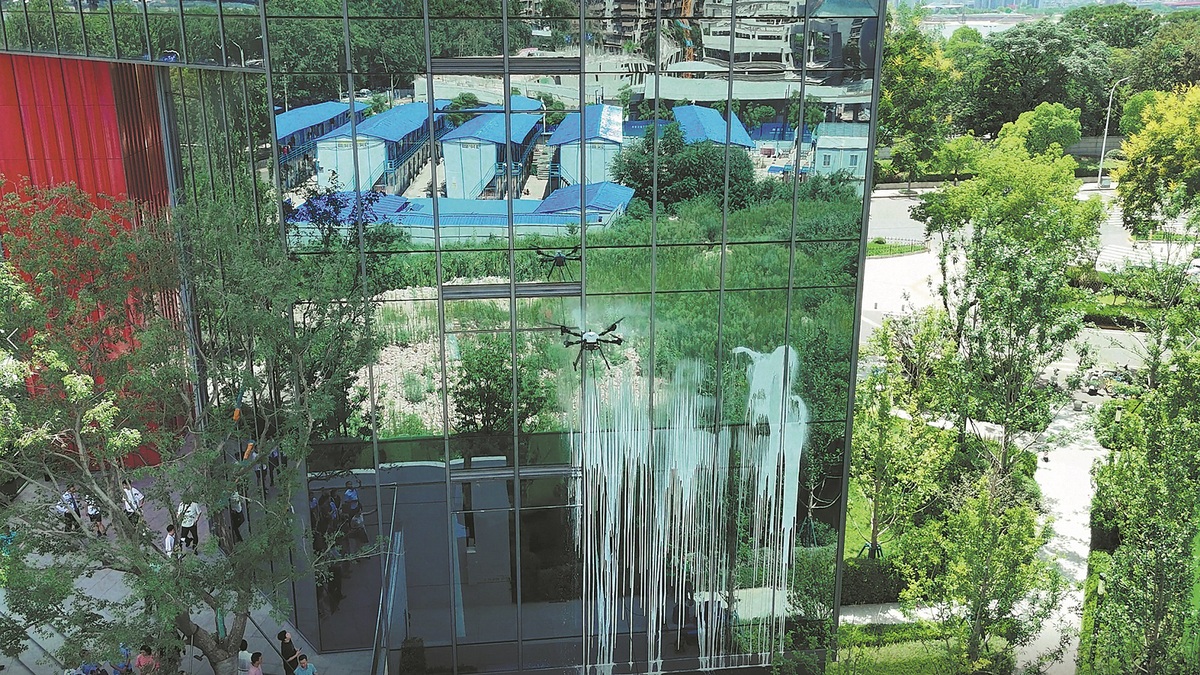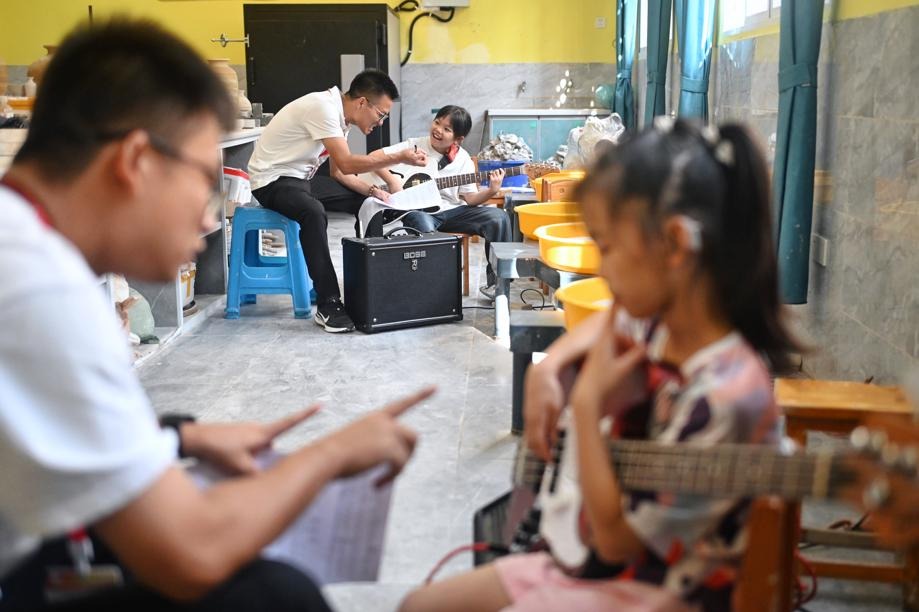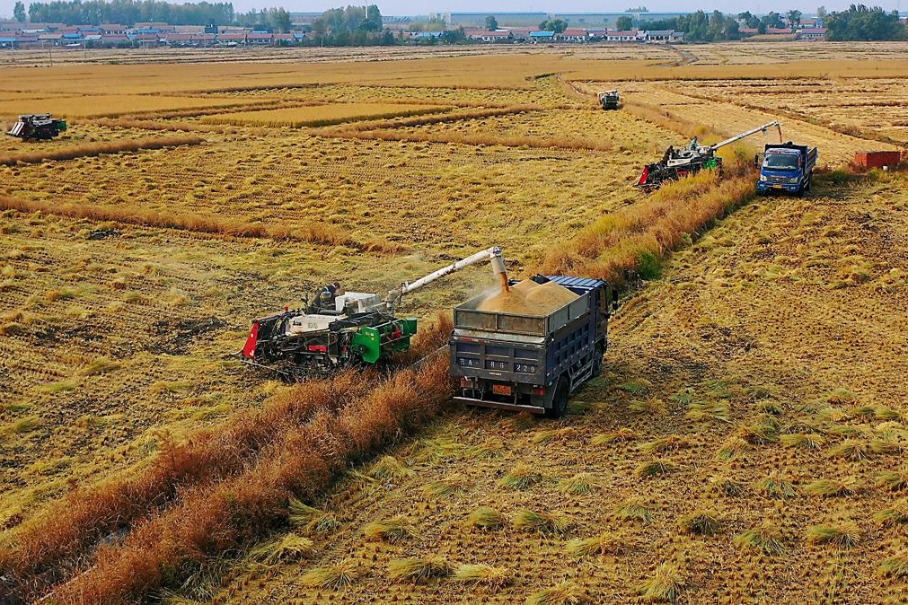Drones make cleaning of high-rises safer, quicker


The "spidermen" who risk their life cleaning skyscrapers while suspended in the air now face a more efficient, cost-effective, and steady replacement.
Recently in Wuhan, Hubei province, a drone equipped with cleaning equipment hovered steadily in the air near a high-rise building, automatically washing away the dust on the glass curtain wall.
Meanwhile, the drone operator controlling the device from below attracted the attention of many passersby. This "aerial cleaner" has completed three high-altitude cleaning services. Compared to traditional workers, the drone increases cleaning efficiency by 20 times while cleaning a maximum of 10,000 square meters of area a day, with the cost dropping by 10 to 20 percent, according to the developer, Aero Technology, a startup in Wuhan.
"Annual accident rate of aerial work is roughly 0.2 percent. Operations must cease in winds of level 4 or higher, making it highly weather-dependent. However, drone ground operations pose minimal safety risks, can withstand level-7 winds, and are capable of working even on rainy days," said Hu Biao, CEO of the company.
Guided by the Beidou Navigation Satellite System and laser radar, the drone operates on the most ideal route. It realizes precise control of the nozzle's angle and pressure, adapting to various building exteriors such as flat, curved, and vertical surfaces, to be able to cover 99 percent of the cleaning areas, Hu added.
After cleaning is completed, the drone uses its camera to capture images of the cleaned surface and transmits them back to ground personnel for verification. If the standard is not met, the cleaning process is repeated. Subsequently, a cleaning report and a "health record" of the building — whether there are hollows or cracks on the exterior facade — can be generated and delivered to the client. After the drone returns to the ground, specialized equipment is used to collect and treat the wastewater.
A drone can complete in 40 minutes what would take a human half a day to accomplish. The total price is 2 to 5 yuan (28-70 cents) per sq m, according to Hu.
Since its launch on Aug 15, the drone has been used to clean glass curtain walls, exterior walls, and billboards of high-rise buildings. The whole process requires one to two pilots, an observer and a safety supervisor.
Its application can also extend to the new energy sector such as photovoltaic panels and wind turbine blades, infrastructure construction such as bridges, industrial inspection, heritage building preservation, and exploration in high-risk environments, according to the company.
Hu used to work at an engineering machinery company for 17 years and dealt with clients in cleaning and logistics. He noticed that traditional "spidermen" need to erect scaffolding and install equipment beforehand, and must suspend gondolas from the high-rise facade during manual cleaning. "This working method is not only inefficient but also prone to causing worker fatigue, posing significant safety risks and hazards," he said.
He said the replacement of "spidermen" by drones for high-altitude operations is an "inevitable trend driven by technological advancement and industrial upgrading", to "use technology to safeguard humans".
If any of the "spidermen" are willing to transition to new roles, the company is prepared to offer opportunities by helping them obtain drone pilot certifications and participate in specialized training, he added.
The company offers 10-15 days of theoretical training, and 1-3 months of practical training for new drone pilots. They must achieve proficiency in flight techniques, understand drone flight principles, and possess knowledge of maintenance and repairs, along with familiarity with drone safety regulations. They should also acquire the ability to process and analyze data collected by drones.
The current monthly salary for drone pilots at the company ranges between 7,000 and 12,000 yuan. "The rise of the drone cleaning industry does not simply eliminate traditional jobs but creates new, safer, and more technically demanding roles, such as drone pilots, observers, safety supervisors, and equipment maintenance technicians. Adapting to these market changes requires joint efforts from both society and individuals," he said.
Ding Jiahao, a drone pilot at the company, said operating a cleaning drone is more difficult than an ordinary drone, because it involves a complex engineering operation requiring the coordination of multiple systems.
"It requires knowledge of cleaning techniques such as water pressure and cleaning agents, familiarity with building structures, and operating in urban environments densely packed with high-rises, which places extremely high demands on precise positioning, obstacle avoidance, and stability," he said.
- Drones make cleaning of high-rises safer, quicker
- Brain cancer drug cleared for phase III clinical trials
- China records 48.3% growth in visa-free entries in Q3
- Chinese researchers design microrobot for precise particle, cell delivery
- Intl vloggers explore cultural beauty of Pingyao Ancient City
- Butterfly farmer's business takes wing in remote village





































